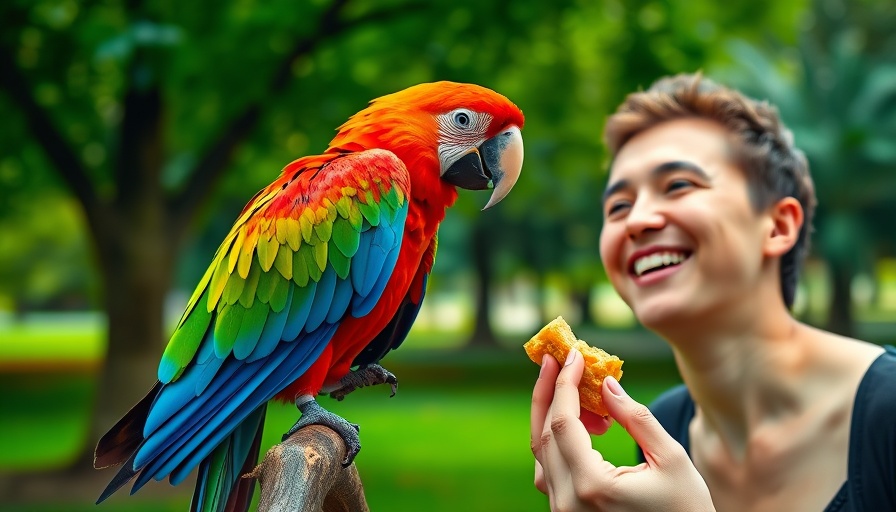
Understanding the Majestic Macaw: A Closer Look
Macaws are renowned as the big birds of the parrot family, captivating individuals with their vibrant feathers, impressive sizes, and dynamic personalities. With an array of species such as the stunning Scarlet macaw and the exotic Hyacinth macaw, each brings their unique flair to any home that welcomes them. But owning a macaw isn't just about their beauty—it's a commitment to understanding their needs and providing a nurturing environment.
Macaw Varieties: Colorful Companions
Among the numerous types of macaws, several stand out as popular pets. From the energetic Blue-and-Gold macaw to the eye-catching Green-winged, each type boasts colorful plumage and distinctive traits. The Hahn's macaw, much smaller yet feisty, demonstrates just how bold these birds can be. For those keen on adopting, understanding the characteristics of each breed is essential. These birds typically require spacious cages and plenty of toys to thrive, mirroring the rich diversity of their natural habitats.
Temperament Traits: An Affectionate Yet Demanding Pet
Macaws are not just aesthetically pleasing; they possess remarkable personalities that often reflect their natural behavior in the wild. Their intelligence is rivaled only by their need for social interaction. Macaws tend to be loud and raucous, making them less than ideal for individuals living in close quarters, such as apartments or condos. They thrive on companionship, making them ideal for families or individuals who can dedicate significant time to them. It’s crucial to understand that neglecting a macaw's social needs can lead to behavioral problems like excessive vocalization, aggression, and even self-mutilation through feather plucking.
Creating a Healthy Environment for Your Macaw
Keeping a macaw as a pet requires a dedicated approach to their care. An average lifespan of 30 to 50 years demands long-term commitment. Ensuring your macaw has a large, stimulating cage filled with interesting toys is essential to sustain their mental and physical health. Regular interaction—whether through playtime, grooming, or training—is vital for a happy macaw. Positive reinforcement during training sessions can foster a strong bond and curb unwanted behavior.
Common Misconceptions About Macaws: Debunking Myths
Many potential bird owners hold misconceptions about macaws, such as the belief that all macaws are suited for first-time bird owners. In reality, they require experienced caretakers who can meet their complex needs. Another myth is that macaws can be kept alone without companionship. These social creatures flourish in the company of their human families and need regular interaction. Lastly, some people believe that macaws can thrive in closed cages. On the contrary, they require vast spaces to move and play, reflecting their natural behaviors.
The Emotional Bond: Why These Birds Are Worth It
Despite their demands, many owners find the emotional rewards of macaw ownership to be invaluable. Known for their affectionate nature, these birds can become incredibly bonded with their human families. Many macaws display loyalty and unique personalities, often having their own quirks and preferences. Engaging in activities with your macaw can be a thrilling experience, whether it's teaching them tricks or simply enjoying their playful demeanor.
Taking the Leap: Is a Macaw Right for You?
Before bringing a macaw into your life, it's essential to assess whether your lifestyle can accommodate these intelligent birds. With their social nature and need for engagement, macaws aren't suitable for everyone. Potential owners should consider their home's environment and whether they can commit time for regular interaction and supervision. For those who embrace the challenge, the joy of nurturing a macaw can be profoundly rewarding.
As you ponder the possibilities of sharing your life with a macaw, remember that understanding their unique needs and providing a loving home will lead to a fulfilling partnership. Whether it's their vibrant colors or their engaging personalities, macaws can truly enrich our lives.
 Add Row
Add Row  Add
Add 


Write A Comment